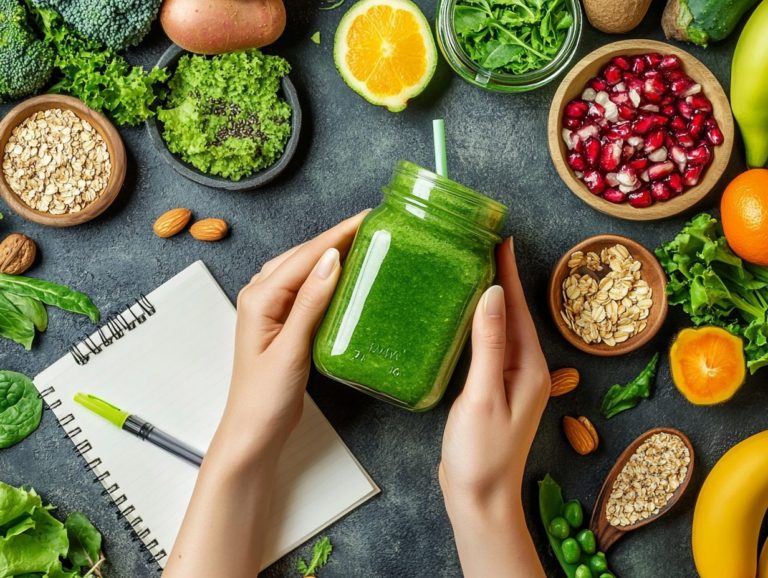What to Expect During Your Detox Journey
Embarking on a detox journey can be both exciting and tough, but you’re not alone! This guide will illuminate the essential stages of detoxification, its purpose, and what you can expect both physically and emotionally.
You ll explore common symptoms to anticipate during the process, along with tips for staying motivated and maintaining healthy habits that support sustainable recovery afterward.
Practical advice awaits you, designed to support you every step of the way. By grasping each phase of the journey, you can navigate your detox with confidence and emerge truly revitalized.
Contents
Key Takeaways:

- Understand the purpose of detoxification and how it can benefit your overall health and well-being.
- Be prepared for physical changes and common symptoms during detox, such as headaches, fatigue, and irritability.
- Address emotional changes during detox by seeking support, managing mood swings, and prioritizing mental health.
- Set yourself up for success by preparing mentally and physically for the detox journey and staying motivated throughout.
- Maintain a healthy lifestyle and ongoing recovery journey after detox by incorporating healthy habits, such as regular exercise and a balanced diet, into your daily routine.
The Detox Process
The detox process, including opioid withdrawal, stands as a vital initial step in your recovery journey if you re facing substance abuse and mental health challenges, whether it involves alcohol, drugs, or particular substances like opioids and benzodiazepines.
This phase helps you safely manage withdrawal symptoms and offers critical medical support, including medications to help with withdrawal like naltrexone and buprenorphine from healthcare providers. By prioritizing your physical and psychological well-being during this transition, you set the foundation for a healthier lifestyle ahead.
Understanding the Purpose of Detoxification
Understanding the purpose of detoxification is crucial for anyone embarking on the recovery journey. Detoxification forms the bedrock for overcoming substance abuse and effectively managing withdrawal symptoms.
By purging harmful substances from your body, you gain clarity and strength, setting the stage for more comprehensive treatment options. This initial phase is vital for easing both physical discomfort and emotional turmoil, making it easier for you to engage in subsequent recovery processes.
Having medical support throughout detox is essential; healthcare professionals are here to help you, monitoring your vital signs and providing emotional support along the way. This expert guidance not only ensures your safety but also boosts your confidence, enabling you to transition smoothly into behavioral therapies and support groups like those provided by the Substance Abuse and Mental Health Services Administration (SAMHSA) designed for sustained recovery.
Physical Changes During Detox
The physical changes you experience during detox can be quite significant. As your body adjusts to eliminating substances such as alcohol, opioids, and benzodiazepines, you may find yourself facing withdrawal symptoms and cravings.
Navigating these challenges can be tough, but understanding the process is an important step toward recovery. Recognizing these changes is crucial for your recovery journey!
Common Symptoms and How to Manage Them

Withdrawal symptoms from alcohol or drugs can vary greatly, from mild discomfort to severe emergencies. Knowing how to manage these symptoms is crucial for a successful recovery.
If you re experiencing alcohol withdrawal, you might face tremors, anxiety, and even hallucinations. This highlights the importance of having a supportive environment around you. For those dealing with opioids, intense cravings, muscle aches, and gastrointestinal distress can be overwhelming without the right guidance. On the other hand, benzodiazepine withdrawal can lead to serious issues like anxiety, seizures, and insomnia, which require immediate medical attention.
Recognizing these symptoms is crucial for your journey. Integrating medications that help with withdrawal, like buprenorphine for opioid withdrawal, or tapering strategies for benzodiazepines, can offer significant relief.
In addition to medications, engaging in therapeutic interventions like cognitive behavioral therapy a type of therapy that helps change negative thinking and mindfulness practices, such as meditation and journaling, can be invaluable in helping you develop effective coping strategies and emotional support.
Emotional Changes During Detox
Expect to deal with intensified anxiety, waves of depression, and unpredictable mood swings during detox.
These feelings are often intensified by the withdrawal period and the dependency on the substances you re striving to move beyond.
Addressing Mood Swings and Mental Health
It s essential to address mood swings and mental health issues during detox, as you may struggle with anxiety and depression. Implementing effective strategies to support your emotional well-being is vital.
One effective approach is engaging in therapy, where trained professionals guide you through your feelings and help you develop coping mechanisms. Cognitive-behavioral therapy and mindfulness practices can be particularly beneficial, as they allow you to gain a deeper understanding of your triggers and emotional responses. Joining support groups offers a sense of community and shared experiences, reinforcing your recovery journey.
Addiction specialists play a vital role in this process by providing personalized care. They ensure that your unique needs are addressed while facilitating a smoother transition through detox, ultimately promoting both physical and mental health stability.
Tips for a Successful Detox Journey
Starting your detox journey requires careful planning, but the rewards are worth it! Whether you choose an inpatient detox or an outpatient program, make sure to follow a well-structured tapering schedule to manage withdrawal.
Getting medical support is essential for navigating cravings and overcoming the challenges that may arise along the way.
Preparing Mentally and Physically

Preparing yourself mentally and physically for a detox program is crucial for success. When you enter this journey with a clear mindset and sound physical health, you can manage cravings and withdrawal symptoms far more effectively.
Setting realistic goals serves as a roadmap to keep you motivated, transforming the journey from overwhelming to achievable. It s also wise to seek support from friends, family, or support groups; their encouragement and accountability can make a significant difference.
On the physical front, maintaining a balanced diet rich in nutrients is key to aiding detoxification. Regular exercise not only elevates your mood but also boosts your energy levels. By incorporating these strategies into your daily life, you foster resilience and improve your overall well-being, making the detox experience not just manageable, but genuinely rewarding.
Staying Motivated and Maintaining Healthy Habits
Staying motivated and maintaining healthy habits during detox is essential for anyone committed to their recovery journey. These practices support your physical health and cultivate emotional resilience.
To enhance your commitment, set short-term goals that are realistic and achievable. This could mean drinking a specific amount of water each day or incorporating a brief daily walk into your routine. Celebrating small achievements whether it s sticking to a healthy meal plan or reaching a week of sobriety reinforces positive behavior and elevates your morale.
Establishing a consistent daily regimen that includes mindfulness exercises, nutritious meals, and adequate rest provides a strong foundation for a successful detox experience. This approach encourages a sense of accomplishment and well-being throughout your journey.
After Detox: Maintaining a Healthy Lifestyle
Once you ve completed the detox, embracing a healthy lifestyle is crucial for your ongoing recovery journey.
This phase requires a solid support system to help you navigate cravings and effectively prevent relapse.
Incorporating Healthy Habits into Your Daily Routine
Incorporating healthy habits into your daily routine is vital after a detox. These practices establish a solid foundation for sustainable recovery and help reduce the risk of cravings.
To enhance your well-being, focus on balanced nutrition. Include a colorful array of fruits, vegetables, whole grains, and lean proteins in your meals. Regular exercise whether that s a brisk walk, a calming yoga class, or an exciting team sport elevates your mood and boosts your energy levels.
Mindfulness practices like meditation or journaling keep you grounded and aware of your thoughts and feelings, cultivating emotional resilience. Engage with a supportive community through volunteering or joining local support groups to build connections that reinforce your journey toward a healthier and more fulfilling life.
Frequently Asked Questions

What can I expect during my detox journey?
During your detox journey, expect to experience physical, mental, and emotional changes as your body eliminates toxins. Common physical symptoms include headaches, fatigue, and nausea. Meanwhile, mental and emotional changes may manifest as mood swings and irritability, along with cravings associated with withdrawal symptoms from alcohol and drugs.
How long does a detox journey typically last?
The duration of a detox journey varies depending on individual needs. Some detox programs last from 3 days to several weeks, depending on the intensity and length of the detox. For those undergoing opioid or benzodiazepine withdrawal, it’s crucial to work with healthcare providers to determine the best tapering schedule.
What can I eat during a detox journey?
Make sure to fill your plate with fresh, whole foods! Focus on eating nutrient-dense options like plenty of fruits, vegetables, lean proteins, and healthy fats.
During this time, avoid processed foods, alcohol, caffeine, and added sugars. If you’re dealing with substance abuse, following a strict detox program can be especially beneficial for your recovery.
Will I experience any withdrawal symptoms during my detox journey?
Depending on your current lifestyle, you might feel some side effects when stopping certain substances. This can include cravings for specific foods or substances, along with physical symptoms like headaches or fatigue.
For those undergoing alcohol detox or opioid withdrawal, these side effects are temporary and will subside as your body adjusts.
How can I support my body during a detox journey?
Support your body during a detox by staying hydrated, getting plenty of rest, and exercising lightly. Incorporate stress-reducing activities like yoga or meditation into your routine.
Listen to your body and make adjustments to your detox plan if needed, possibly with the help of an addiction specialist or medical support.
Can I continue taking my medication during a detox journey?
If you’re currently taking medication, consult with your healthcare provider before starting your detox journey. They can guide you on whether it’s safe to continue your medication and if any adjustments are necessary.
It’s crucial to discuss any medications, especially if you use substances like Xanax, Valium, OxyContin, or other opioids, and explore options for medication-assisted treatment if needed.






